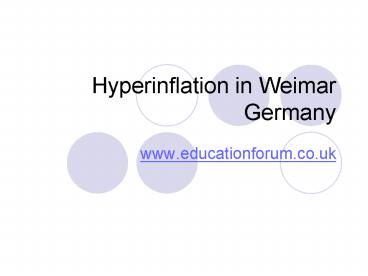Hyperinflation in Weimar Germany - PowerPoint PPT Presentation
Title:
Hyperinflation in Weimar Germany
Description:
Hyperinflation in Weimar Germany www.educationforum.co.uk Rich Kids? Fuel What is Inflation? The word `inflation' describes a situation in which prices are rising and ... – PowerPoint PPT presentation
Number of Views:261
Avg rating:3.0/5.0
Title: Hyperinflation in Weimar Germany
1
Hyperinflation in Weimar Germany
- www.educationforum.co.uk
2
Rich Kids?
3
Fuel
4
What is Inflation?
- The word inflation' describes a situation in
which prices are rising and the value of money is
falling. It is commonly said that inflation is
caused by too much money chasing too few goods.
Inflation occurs, in other words, when the supply
of goods fails to keep up with demand. Inflation
is not easy to stop once it has got started. An
inflationary spiral tends to set in. Rising
prices produce a demand for higher wages higher
wages mean that goods cost more to produce
prices have to go up again to pay for the wage
increases.
5
Causes of Hyperinflation
- Germany began to suffer serious inflation during
the war. The German government did not pay for
the war by taxing people more heavily. Instead it
paid its bills by printing banknotes. Soon there
was too much money chasing too few goods. An
inflationary spiral had started.
6
From Inflation to Hyperinflation
- Things got worse at the end of the war. A
huge amount in reparations was demanded from
Germany. The sum to be paid was fixed at
6,600,000 in 1921. Many foreigners thought that
Germany would be unable to pay. They began to
lose confidence in Germany's currency. Foreign
banks and businesses expected increasingly large
amounts of German money in exchange for their own
currency. It became very expensive for Germany to
buy food and raw materials from other countries.
This led to a further increase in prices in
Germany.
7
Invasion
- Late in 1922 Germany failed to pay an instalment
of reparations on time. France replied in January
1923 French troops occupied Germany's main
industrial region, the Ruhr. The French were
determined to make Germany pay every penny she
owed. They wanted to keep Germany weak. A weak
Germany meant that France was safe from the
threat of attack.
8
Hyperinflation
- The German government ordered a policy of passive
resistance in the Ruhr. Workers were told to do
nothing which helped the invaders in any way.
What this meant in practice was a general strike.
The cost of the government's policy was
frightening. All the workers on strike had to be
given financial support. The government paid its
way by printing more and more banknotes. Germany
was soon awash with paper money. The result was
hyperinflation.
9
Effects
- Prices ran out of control - eg a loaf of bread,
which cost 250 marks in January 1923 had risen to
200,000 million marks in November 1923. German's
currency became worthless. - Some people used money as fuel.
- People turned against the Weimar government and
blamed them for the crisis - Business couldnt operate and people lost their
jobs - Peoples savings lost their value
- Support for the extreme parties Nazis and
Communists grew
10
More Rebellions
- Unsurprisingly, the hardships created by
hyperinflation led to many uprisings as groups
struggled to take power from Weimar. - A nationalist group called Black Reichswehr
rebelled in Berlin. - A fascist group called the Nazis attempted a
putsch (A revolt against a government.) in
Munich. - Communists took over the governments of Saxony
and Thuringia - Communists also took over the Rhineland and
declared it independent.































